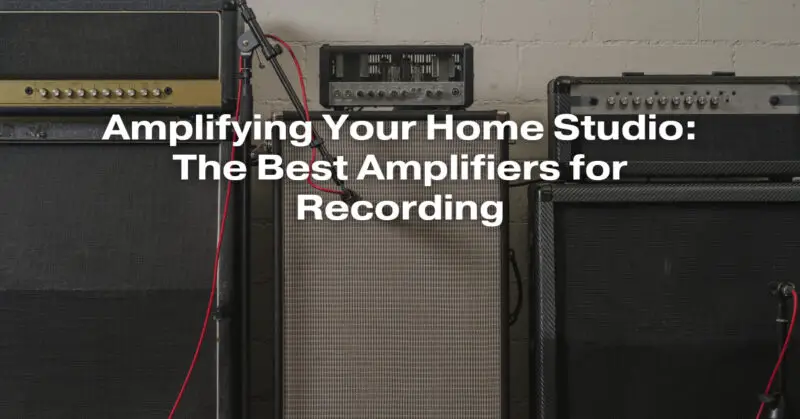A well-equipped home studio requires the right amplifier to capture and reproduce your musical creations with precision and clarity. Whether you’re a guitarist, recording vocals, or working with other instruments, choosing the best amplifier for recording is essential for achieving professional-quality results. In this guide, we’ll explore the top amplifiers suited for home studio use, considering various recording scenarios and needs.
Why Choose the Right Amplifier for Recording?
Recording presents unique challenges that demand specific qualities from amplifiers:
- Clean Signal: Amplifiers for recording should provide a clean, noise-free signal to ensure high-quality recordings with minimal post-processing.
- Tonal Control: The ability to shape and control the amplifier’s tone is crucial for achieving the desired sound in a recording.
- Versatility: Different recording scenarios may require different amplifiers. Versatile amplifiers can adapt to various instruments and genres.
- Consistency: The amplifier should offer consistent performance and reliability to ensure consistent sound quality across multiple recording sessions.
Top Amplifiers for Recording in a Home Studio
Here are some of the best amplifiers suitable for home studio recording:
1. Fender ’65 Princeton Reverb:
- A classic tube amplifier with 15 watts of power.
- Renowned for its clean and warm tone, making it ideal for recording guitars and pedals.
- Features built-in spring reverb and tremolo.
2. Kemper Profiling Amp:
- A digital modeling amplifier that profiles and replicates the sound of various amplifiers.
- Offers a wide range of tones and is excellent for recording versatility.
- Ideal for guitarists seeking precise amp emulation.
3. Universal Audio OX Amp Top Box:
- A reactive load box and attenuator with built-in speaker emulations.
- Allows you to crank up your amplifier while recording silently.
- Provides multiple mic placements and room simulations for tonal flexibility.
4. Yamaha THR10 II:
- A compact and versatile modeling amplifier.
- Offers a variety of amp models and effects for electric and acoustic guitars.
- Ideal for guitarists looking for a portable solution with recording capabilities.
5. Line 6 Helix LT:
- A powerful modeling processor with amp and effect modeling.
- Provides a vast array of tones and is suitable for guitarists and bassists.
- Ideal for those seeking an all-in-one solution for recording and live performance.
6. Vox AC15C1:
- A tube amplifier with 15 watts of power and a classic British tone.
- Suitable for recording vintage-style guitar tones with character.
- Features built-in spring reverb and tremolo.
7. Roland JC-120 Jazz Chorus:
- A solid-state amplifier known for its clean and pristine sound.
- Offers stereo capabilities, making it excellent for keyboards and electric guitars.
- Ideal for capturing a clear, unaffected tone.
Conclusion
Selecting the right amplifier for your home studio recording is pivotal to achieving professional-quality results. The amplifiers listed above cater to various recording scenarios and musical needs, from clean and pristine tones to versatile modeling solutions. Whether you’re a guitarist, vocalist, or multi-instrumentalist, investing in the right amplifier will elevate your recordings and provide the tonal control and consistency needed for a successful home studio setup.


